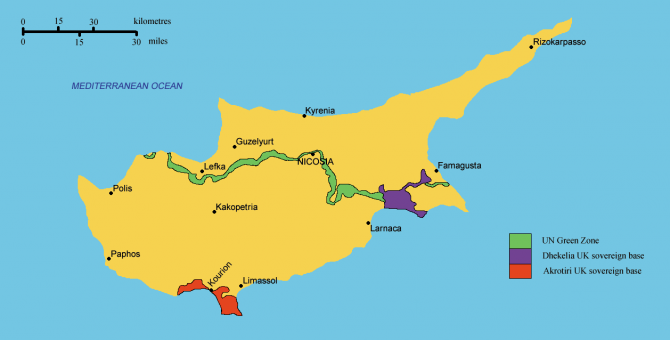
The angry collapse of UN-sponsored talks to reunify the Greek and Turkish parts of Cyprus after over four decades may lead to the first permanent partition inside the European Union.
Announcing Friday’s breakdown, Antonio Guterres, the UN secretary general made these remarks:
Secretary-General: I am deeply sorry to inform you that, despite the very strong commitment and the engagement of all the delegations and the different parties, the Greek and Turkish Cypriot delegations, Greece, Turkey, the United Kingdom, and the European Union, as an observer, and, of course, the United Nations team, the Conference on Cyprus was closed without an agreement being reached.
I want to express my deep gratitude and appreciation to the leaders of the two communities and to wish the best for all the Cypriots, north and south. I also want to express my deep gratitude to the representatives of the Guarantor Powers and the European Union, and to express my enormous appreciation for the UN team, lead by Espen Eide, that has done everything possible to bring closer the positions of the different delegations.
Unfortunately, as I said, an agreement was not possible and the conference was closed without the possibility to bring a solution to this dramatically long-lasting problem.Q: Could you please if the parties will continue the negotiations or if they said they will stop?
Secretary-General: The conference is closed. That doesn’t mean that other initiatives can not be developed in order to address the Cyprus problem. But this conference was closed, unfortunately, without result. The United Nations role is the role of a facilitator and we will be always be at the disposal of the parties willing to come to an agreement, if that would be the case.
This seeming end of hope for reunification is a serious matter because the central dispute is between two NATO allies — Greece and Turkey.
In 1974, Turkey seized a part of Cyprus with a majority Turkish population near its shores to prevent an attempt by Greece to unify all Cypriots under Greek rule.
It has nearly 40,000 Turkish troops on Cypriot soil although the Greek part of the island is a long-standing member of the EU.
Britain, which has two small sovereign military bases in Cyprus, was the controlling power over the island before independence in 1960. It remains a “guarantor power” together with Turkey to keep the peace between Greek and Turkish Cypriots. Greece is also a “guarantor power.”
Hostility between Greek and Turkish Cypriots ended years ago and both are keen to unite as an undivided EU member.
The UN-sponsored talks cleared the way for a unified country with power sharing formulas accepted by both sides and agreements on property and compensation issues stemming from the 1974 separation.
But Turkey insisted at the latest round of talks in Switzerland this week that it must retain troops and have the right to intervene militarily just in case Greek Cypriots, aided by Greece or other EU countries, take actions with negative consequences for Turkish Cypriots.
The Cyprus government offered to explore ways to defuse Turkey’s concerns but refused to allow a significant troop presence with a right of intervention on its territory.
“We were willing to negotiate [troop numbers] but Cyprus is an independent EU state. It is not acceptable for a third state to have the unilateral right of [military] intervention in 2017,” a spokesperson said.
UN mediator Espen Barth Eide said the positions of both sides were “close but not close enough”. Neither Guterres nor Eide have given up hope but no further sessions of talks are scheduled.
Unless Turkey suddenly changes its stand, the only apparent option is a permanent partition. That might mean Ankara annexes the Turkish Cypriot segment or the tiny half-dot in the ocean would somehow eke out economic existence as an independent entity.
The standoff on Cyprus does not weaken the NATO alliance but it does mean that Turkey is unwilling to accept the human right of Turkish Cypriots to choose to belong to the EU in a unified republic.
It is also sees the military base as vital for Turkish security because it does not trust fellow NATO ally Greece or other EU members.
Map by Chaosdruid (talk) – I (Chaosdruid (talk)) created this work entirely by myself., CC BY-SA 3.0, https://en.wikipedia.org/w/index.php?curid=25813868
CORRECTION: An earlier version of this post did not have the correct quote from the Secretary General. A map inserted by an editor was not the correct map. TMV regrets the errors.
















